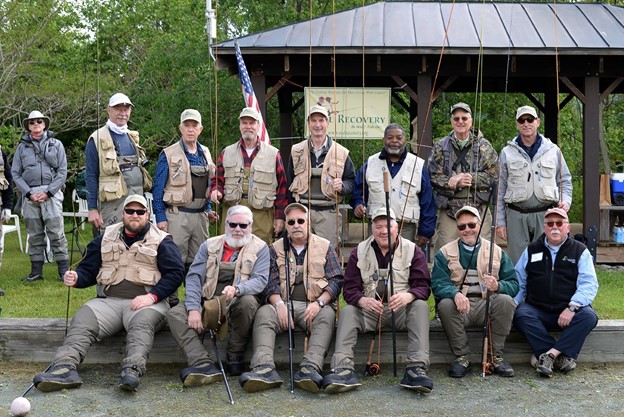When Jacob Spears, a Warsaw resident, heard about the Reel Recovery cancer retreat, he was almost exclusively focused on learning to fly fish. That this was a cancer retreat designed for men was initially less of a reason to participate. Months later when reflecting on his experience, he is equally grateful for the valuable experience of comradery and commonality that he found among the group.
“I didn’t know what to expect,” Spears admits. “I had never fly fished before and I wanted to learn. But the entire experience ended up being better than I expected.”
Roughly one year ago Spears was diagnosed with testicular cancer, which had spread to a few lymph nodes. After undergoing surgery at Retreat Doctors’ Hospital in Richmond in late August, Spears received chemotherapy treatment at the Cancer Infusion Center at Riverside Tappahannock Hospital. His treatments lasted from September through Thanksgiving.
Spears was grateful to receive his chemo and follow up care closer to home and among such competent and compassionate staff. It was the staff at the Cancer Center who recommended Spears as a candidate for the Reel Recovery cancer retreat.
Reel Recovery is a national non-profit organization that offers free fly fishing retreats for men living with all forms of cancer. That includes men who are currently battling cancer to men who are many years post-treatment. There are a couple of Virginia retreats scheduled each year – typically one devoted to active military or veterans and another open to anyone. The retreat that Spears attended in May of 2019 took place in Syria, Virginia.
Reel Recovery was founded in 2003 by a group of avid fly-fishers, inspired by their friend’s ongoing battle with brain cancer. Witnessing first-hand the beneficial impact fly fishing provided their friend, they created Reel Recovery to provide the same opportunity for other men battling the disease. The organization combines expert fly fishing instruction with directed “courageous conversations” to give men a unique opportunity to share their stories, learn a new skill, form lasting friendships, and gain renewed hope as they confront the challenges of cancer.
While Spears was looking forward to learning to fish, he was not aware of the impact that the many courageous conversations would have on his own cancer journey and retreat experience. Interspersed with fishing instruction, facilitators would lead conversations for the entire group of men. Each retreat is capped at roughly 14 participants to encourage a sense of intimacy and rapport among the group.
“Men, by nature, don’t talk about feelings a lot,” admits Spears. “To watch the group open up and share was amazing. There was so much to learn [from each other], especially about the questions you’re afraid to ask.”
Spears also learned that men don’t have to experience the same cancer journey to have a bond. For Spears, he knew his testicular cancer was “behind him” when he finished treatment. But he quickly learned that no one at the retreat cared where you were on the cancer journey. There was still value in sharing what you had been through, talking about the struggles and finding a sense of community among the group.
As for the fishing, Spears was impressed with the caliber of training. Each participant had a guide and was given complete instruction. Spears said there was not a lot of anxiety in learning to fly fish because they provided a lot of help. He’s been trying to find equipment and time to continue the hobby since the retreat.
Spears has also become an advocate for the Reel Recovery retreat experience. He believes it is important for men to learn how to enjoy themselves, no matter how recent or long ago their experience with cancer.
“If a guy has cancer and any interest in the outdoors, he needs to go,” Spears says.
He knows first-hand how valuable the experience can be.
